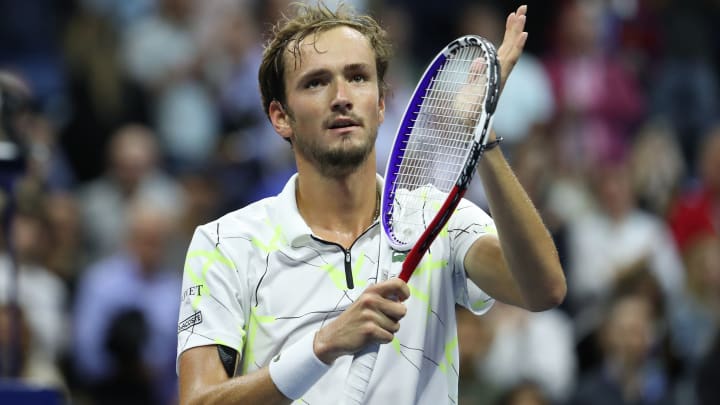After Reaching U.S. Open Final, Can Daniil Medvedev Disrupt Big Three's Dominance?

NEW YORK — The shortcomings of tennis’s Next Generation can be distilled into a single, stunning statistic: No man currently under the age of 30 has ever won a Grand Slam singles title.
That is, of course, largely due to the sustained hegemony of three players. Dating back to Wimbledon 2003, Roger Federer, Novak Djokovic and Rafael Nadal have combined to win 54 of the last 65 majors—and they aren’t done yet. Nadal will look to make it 55 of 66 on Sunday—and, with a 19th Slam, pull within one of Federer’s all-time record—when he faces Daniil Medvedev in the U.S. Open final. The Spaniard advanced to his 27th major final Friday with a straight-set victory over Matteo Berrettini, who never recovered from a bitterly disappointing first-set tiebreak that saw him blow two set points with unforced errors.
"It means a lot to be back where I am today, after some really tough moments earlier in the season,” Nadal said after the match.
He’ll be a heavy favorite over Medvedev, who earlier Friday beat Grigor Dimitrov 7-6, 6-4, 6-3, booking his first chance at Grand Slam glory with an industrious effort at Arthur Ashe Stadium. It was Medvedev’s 20th victory in 22 matches during the North American hardcourt swing.
Should he be able to win one more, the 23-year-old Medvedev would become the youngest male Grand Slam winner since 20-year-old Juan Martin del Potro triumphed here in 2009. He would also accomplish the ultra-rare feat of breaking the Big 3’s seemingly perpetual oligopoly. Andy Murray did it three times. So did Stan Wawrinka. Andy Roddick, Gaston Gaudio and Marat Safin each snuck one in while Djokovic and Nadal were still teenagers. Marin Cilic caught fire for a week and won his.
Of those seven men, only Wawrinka (34) and Cilic (30) were in the main draw here this year. Roddick, Gaudio and Safin have long since retired. Murray played a Challenger last week and is attempting a comeback, but at 32 and coming off hip surgery, the odds of him adding to his major haul are slim. Del Potro, 30, has been dealt perhaps the roughest hand of any modern player, his prime ravaged by injury after injury.
For years, we’ve been waiting for the emergence of a new crop of stars to usher men’s tennis into a new, post-Federer/Djokovic/Nadal era. We’re still waiting. Milos Raonic looked a likely candidate in 2016, when he reached the Wimbledon final and became world No. 3 at 25. Three years and multiple injuries later, he’s dropped to No. 22. Dimitrov also showed signs, winning the 2017 ATP Finals and also reaching No. 3 at 26, but he had fallen all the way to No. 78 before the resurgence in this tournament. Kei Nishikori has been a consistent performer and reached the U.S. Open final in 2014, but he’s now 29 and seems to lack the firepower to win the biggest titles. Nick Kyrgios profiles as the most talented of the bunch, but he’s still better-known for his erratic behavior and fleeting effort, which tells you everything you need to know about his Grand Slam record.
Dominic Thiem, 25, is the only “NextGen” player to have reached a Slam final, having lost to Nadal in the last two French Open finals. Alexander Zverev, 22, and Stefanos Tsitsipas, 21, have both broken into the top 10 but neither has reached a major final.
Medvedev never seemed most likely to become the first player of his generation to win a Grand Slam. He lacks the power of a Zverev, the grace of a Tsitsipas. He was never a top-10 junior and was ranked outside the top 30 just a year ago. His groundstrokes are unconventional—he almost looks to be standing too close to the ball, as if he’s trying to hit a backhand inside a telephone booth. He beats you with consistency. He outlasts you. He does not wow you with variety nor is he the type to produce highlight-reel rallies.
Here’s what he is producing: wins. So, so many of them. For anyone who has been paying attention to tennis this summer, his New York is anything but a surprise. He reached back-to-back finals in Washington D.C. and Montreal before winning his first Masters 1000 title in Cincinnati. “I love USA,” he joked after beating Dimitrov. It’s easy to see why.
More surprising has been the way he’s reached the final. Medvedev overcame cramps in a second-round win against Hugo Dellien. He made a brief but aggressive foray into villainy in the third round, when he flipped the bird then egged on a booing crowd, and continued the schtick after a fourth-round victory. In the first set of his quarterfinal win over Wawrinka, he looked more likely to retire than advance. Order was restored in Friday’s semi—benefitting from two full days’ rest to rejuvenate a sore quad, he wore down Dimitrov, allowing the former world No. 3 to beat himself with 46 unforced errors.
Now he gets Nadal, who pumped him in their only previous meeting: a 6-3, 6-0 beatdown in the Rogers Cup final just 26 days ago.
“He's just a machine, a beast on the court,” Medvedev said of Nadal. “The energy he's showing is just amazing. To play him in your first Grand Slam final should be, I want to say, a funny thing. It's not going to be a funny thing, but it's going to be an amazing thing to live.”
That beast, despite being a full decade older than his challenger, will love his chances in that match. He’s now made the final in three of the four Grand Slams this year and he’s playing fantastic tennis at a tournament he’s won three times before.
So in all likelihood, Nadal will most likely be just one major behind Federer, making his GOAT case stronger than ever with another French Open—where Nadal will be the overwhelming favorite so long as it’s still played on red clay—just eight months away.
Or Daniil Medvedev, the lanky, pesky Russian with a quirky game, will give us a sneak peek at what post-Big 3 life looks like.
“At some point, the day will happen sooner rather than later, that this era is gonna end,” Nadal said. “We’re arriving to that … the clock doesn’t stop. That’s part of the cycle of life.”
